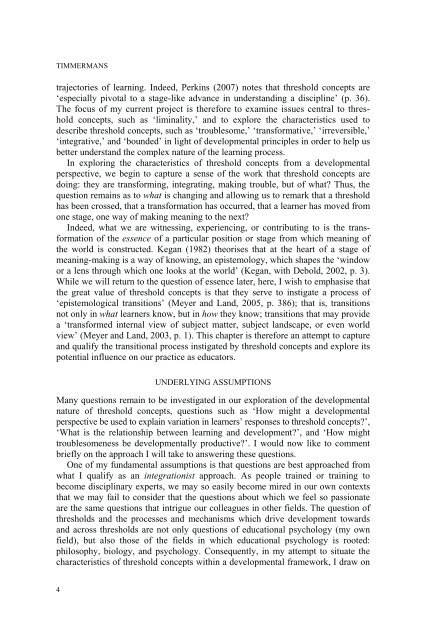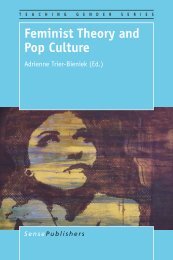JULIE A. TIMMERMANS1. CHANGING OUR MINDSThe Developmental Potential of Threshold ConceptsINTRODUCTIONIn writing this chapter, I have to come to a startling personal revelation: I ama philosopher, if only an amateur one. Perhaps this revelation should not be sostartling, for I have always been a lover (philo) of wisdom (sophia). And I am,after all, in the process of completing a doctor of philosophy degree.At the heart of a philosopher’s approach lies the activity of asking questions.Gaarder (1994) explains, however, that philosophers are generally not captivatedby the entire realm of philosophical questions, yet have particular queries withwhich they are especially concerned. Therefore, philosophers’ questions providevaluable insight into their philosophical projects.What, then, is my philosophical project? Broadly, in my work, I am intrigued byquestions about <strong>learning</strong> in higher education. At the beginning of each project,I therefore return to the question ‘What is <strong>learning</strong>?’ for I realise that myinterpretation lies at the heart of all subsequent thinking. Here, I adopt theperspective that <strong>learning</strong> is an active process of meaning-making (e.g., Anderson<strong>and</strong> Krathwohl, 2001; Belenky, Clinchy, Golberger, <strong>and</strong> Tarule, 1986/1997;Kegan, 1982; Perry, 1970). The question that follows, then, is ‘How does <strong>learning</strong>happen?’ Indeed, <strong>learning</strong> is often characterised as a developmental process. In hisConstructive-Developmental Theory of Meaning-Making, Robert Kegan (1982)elegantly weaves together the notions of meaning-making <strong>and</strong> development, <strong>and</strong>posits that individuals’ abilities to construct meaning evolve through regular periodsof stability <strong>and</strong> change throughout their lifespan.It is these periods of change, these transitions that characterise the <strong>learning</strong>process, which I find most intriguing. These transitions remain nebulous; however,underst<strong>and</strong>ing them is crucial. Cross (1999) notes that ‘in developmental theory,the periods of greatest personal growth are thought to lie in the unnamed <strong>and</strong>poorly-defined periods between stages’ (p. 262; emphasis in original). We mighttherefore imagine that the most significant aspect of <strong>learning</strong> lies not in theoutcomes of <strong>learning</strong>, but in the process of <strong>learning</strong>. Underst<strong>and</strong>ing this process<strong>and</strong> how best to facilitate it is thus essential to our work as educators.How fortunate, then, that we may now turn to the growing body of literature on<strong>threshold</strong> <strong>concepts</strong> for, in their identification of <strong>threshold</strong> <strong>concepts</strong>, Meyer <strong>and</strong>L<strong>and</strong> (2003) appear to have captured the inherently developmental nature of theseJ. H. F. Meyer, R. L<strong>and</strong> <strong>and</strong> C. Baillie (eds.), Threshold Concepts <strong>and</strong>Transformational Learning, 3–19.© 2010 Sense Publishers. All rights reserved.
TIMMERMANStrajectories of <strong>learning</strong>. Indeed, Perkins (2007) notes that <strong>threshold</strong> <strong>concepts</strong> are‘especially pivotal to a stage-like advance in underst<strong>and</strong>ing a discipline’ (p. 36).The focus of my current project is therefore to examine issues central to <strong>threshold</strong><strong>concepts</strong>, such as ‘liminality,’ <strong>and</strong> to explore the characteristics used todescribe <strong>threshold</strong> <strong>concepts</strong>, such as ‘troublesome,’ ‘transformative,’ ‘irreversible,’‘integrative,’ <strong>and</strong> ‘bounded’ in light of developmental principles in order to help usbetter underst<strong>and</strong> the complex nature of the <strong>learning</strong> process.In exploring the characteristics of <strong>threshold</strong> <strong>concepts</strong> from a developmentalperspective, we begin to capture a sense of the work that <strong>threshold</strong> <strong>concepts</strong> aredoing: they are transforming, integrating, making trouble, but of what? Thus, thequestion remains as to what is changing <strong>and</strong> allowing us to remark that a <strong>threshold</strong>has been crossed, that a transformation has occurred, that a learner has moved fromone stage, one way of making meaning to the next?Indeed, what we are witnessing, experiencing, or contributing to is the transformationof the essence of a particular position or stage from which meaning ofthe world is constructed. Kegan (1982) theorises that at the heart of a stage ofmeaning-making is a way of knowing, an epistemology, which shapes the ‘windowor a lens through which one looks at the world’ (Kegan, with Debold, 2002, p. 3).While we will return to the question of essence later, here, I wish to emphasise thatthe great value of <strong>threshold</strong> <strong>concepts</strong> is that they serve to instigate a process of‘epistemological transitions’ (Meyer <strong>and</strong> L<strong>and</strong>, 2005, p. 386); that is, transitionsnot only in what learners know, but in how they know; transitions that may providea ‘transformed internal view of subject matter, subject l<strong>and</strong>scape, or even worldview’ (Meyer <strong>and</strong> L<strong>and</strong>, 2003, p. 1). This chapter is therefore an attempt to capture<strong>and</strong> qualify the transitional process instigated by <strong>threshold</strong> <strong>concepts</strong> <strong>and</strong> explore itspotential influence on our practice as educators.UNDERLYING ASSUMPTIONSMany questions remain to be investigated in our exploration of the developmentalnature of <strong>threshold</strong> <strong>concepts</strong>, questions such as ‘How might a developmentalperspective be used to explain variation in learners’ responses to <strong>threshold</strong> <strong>concepts</strong>?’,‘What is the relationship between <strong>learning</strong> <strong>and</strong> development?’, <strong>and</strong> ‘How mighttroublesomeness be developmentally productive?’. I would now like to commentbriefly on the approach I will take to answering these questions.One of my fundamental assumptions is that questions are best approached fromwhat I qualify as an integrationist approach. As people trained or training tobecome disciplinary experts, we may so easily become mired in our own contextsthat we may fail to consider that the questions about which we feel so passionateare the same questions that intrigue our colleagues in other fields. The question of<strong>threshold</strong>s <strong>and</strong> the processes <strong>and</strong> mechanisms which drive development towards<strong>and</strong> across <strong>threshold</strong>s are not only questions of educational psychology (my ownfield), but also those of the fields in which educational psychology is rooted:philosophy, biology, <strong>and</strong> psychology. Consequently, in my attempt to situate thecharacteristics of <strong>threshold</strong> <strong>concepts</strong> within a developmental framework, I draw on4
- Page 1 and 2: EDUCATIONAL FUTURES: RETHINKING THE
- Page 3 and 4: EDUCATIONAL FUTURESRETHINKING THEOR
- Page 5 and 6: A C.I.P. record for this book is av
- Page 7 and 8: TABLE OF CONTENTS10. Threshold Conc
- Page 9 and 10: Pax Intrantibus Salus Exeuntibus. L
- Page 11 and 12: LAND ET ALstudents experience diffi
- Page 13 and 14: LAND ET ALModePreliminalLiminalPost
- Page 15 and 16: LAND ET AL(Barker, 1991, p.184). Th
- Page 17 and 18: LAND ET ALvariations arising from t
- Page 19 and 20: LAND ET ALform of a model of concep
- Page 21 and 22: LAND ET ALQuestions of intersection
- Page 24 and 25: EDITORS’ PREFACEstudents bring to
- Page 26 and 27: EDITORS’ PREFACEconcepts in the f
- Page 28 and 29: EDITORS’ PREFACEIn the final illu
- Page 30 and 31: EDITORS’ PREFACEhence becomes a n
- Page 32 and 33: EDITORS’ PREFACElearning. This th
- Page 34 and 35: EDITORS’ PREFACEa lens or ‘way
- Page 36 and 37: EDITORS’ PREFACEHence learning is
- Page 38 and 39: EDITORS’ PREFACEthe Communitas, w
- Page 40 and 41: EDITORS’ PREFACEBuilding on these
- Page 42 and 43: EDITORS’ PREFACECousin, G. (2009)
- Page 44 and 45: DAVID PERKINSFOREWORDEntrance…and
- Page 46: FOREWORDMeyer, J.H.F., Land, R. & D
- Page 52 and 53: CHANGING OUR MINDSKegan’s (1982)
- Page 54 and 55: CHANGING OUR MINDSKegan describes e
- Page 56 and 57: CHANGING OUR MINDSIn fact, Kegan an
- Page 58 and 59: CHANGING OUR MINDSat the epistemolo
- Page 60 and 61: CHANGING OUR MINDSMight a learner r
- Page 62 and 63: CHANGING OUR MINDSreveals an additi
- Page 64 and 65: CHANGING OUR MINDSBendixen, L. D.,
- Page 66: CHANGING OUR MINDSSibbett, C., & Th
- Page 69 and 70: SCHWARTZMANScholarship in liminalit
- Page 71 and 72: SCHWARTZMANTC: the entityThe term T
- Page 73 and 74: SCHWARTZMANA resource for teaching
- Page 75 and 76: SCHWARTZMANunprecedented to attract
- Page 77 and 78: SCHWARTZMANspectrum of scholarship
- Page 79 and 80: SCHWARTZMANrupture and phenomenolog
- Page 81 and 82: SCHWARTZMANfield(s) of one’s cons
- Page 83 and 84: SCHWARTZMAN36DATA: PARTICULARS GIVI
- Page 85 and 86: SCHWARTZMANchallenge than interpret
- Page 87 and 88: SCHWARTZMANStrategies for Teaching:
- Page 89 and 90: SCHWARTZMANThey are redefined here
- Page 91: SCHWARTZMANLoder, J. (1981). The tr




